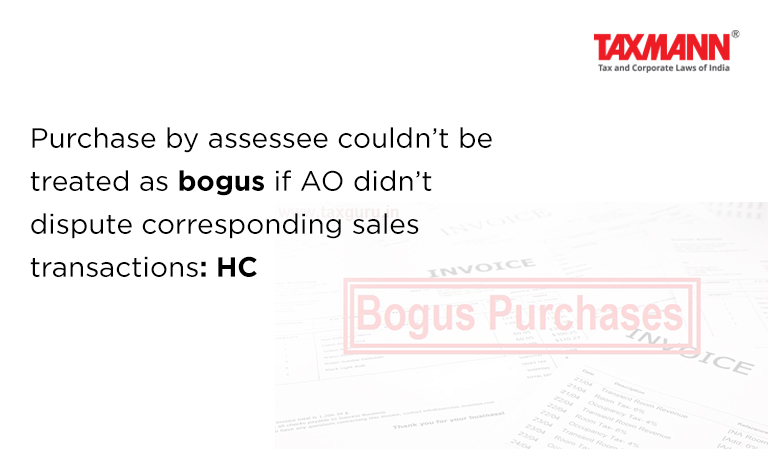Purchase by assessee couldn’t be treated as bogus if AO didn’t dispute corresponding sales transactions: HC
- Blog|News|Income Tax|
- 2 Min Read
- By Taxmann
- |
- Last Updated on 4 January, 2023

Case Details: Principal Commissioner of Income-tax v. Nitin Ramdeoji Lohia - [2022] 145 taxmann.com 546 (Bombay)
Judiciary and Counsel Details
-
- Dhiraj Singh Thakur & Abhay Ahuja, JJ.
- Suresh Kumar, Adv. for the Appellant.
- Mihir C. Naniwadekar & Ruturaj H. Gurjar, Advs. for the Respondent.
Facts of the Case
Assessee, an individual, was engaged in the business of trading in industrial oil and transport services. During the relevant assessment year, the Assessing Officer (AO) received certain information from the sales tax department regarding the beneficiaries of bogus purchases.
Upon receipt of information, assessee being one of the beneficiaries of the bogus purchases, AO initiated assessment proceedings and computed the income accordingly.
Assessee contended that the AO could not challenge the purchases as bogus since the amount of corresponding sales was not challenged by him in the proceedings.
The matter reached the Bombay High Court.
High Court Held
The Court held that the AO had not finished the investigation in the case and had not looked into the affidavits and confirmation letters submitted by the assessee from the dealers from whom it made purchases. The assessee demonstrated the fact of making purchases from these parties, and the AO presented no evidence to contradict this.
Further, the fact that AO did not challenge the sales indicates that these were not bogus purchases. If the purchases were fake, it would not have been possible for the assessee to complete the sale transaction. In the instant case, where corresponding sales are not disputed, the purchases cannot be held as bogus unless the purchases are made from bogus entities.
Therefore, the Court held that the transaction could not be considered as a sham transaction and deleted the addition made by the AO.
List of Cases Reviewed
-
- Order of ITAT, Pune in Income-tax Appeal Nos. 1408 and 1409 (PUN) of 2015, dated 5-7-2017 (para 7) partly affirmed.
Disclaimer: The content/information published on the website is only for general information of the user and shall not be construed as legal advice. While the Taxmann has exercised reasonable efforts to ensure the veracity of information/content published, Taxmann shall be under no liability in any manner whatsoever for incorrect information, if any.

Taxmann Publications has a dedicated in-house Research & Editorial Team. This team consists of a team of Chartered Accountants, Company Secretaries, and Lawyers. This team works under the guidance and supervision of editor-in-chief Mr Rakesh Bhargava.
The Research and Editorial Team is responsible for developing reliable and accurate content for the readers. The team follows the six-sigma approach to achieve the benchmark of zero error in its publications and research platforms. The team ensures that the following publication guidelines are thoroughly followed while developing the content:
- The statutory material is obtained only from the authorized and reliable sources
- All the latest developments in the judicial and legislative fields are covered
- Prepare the analytical write-ups on current, controversial, and important issues to help the readers to understand the concept and its implications
- Every content published by Taxmann is complete, accurate and lucid
- All evidence-based statements are supported with proper reference to Section, Circular No., Notification No. or citations
- The golden rules of grammar, style and consistency are thoroughly followed
- Font and size that’s easy to read and remain consistent across all imprint and digital publications are applied



 CA | CS | CMA
CA | CS | CMA
